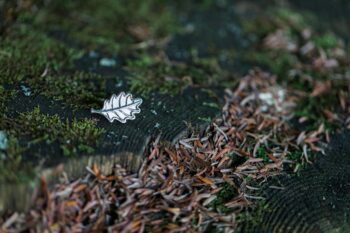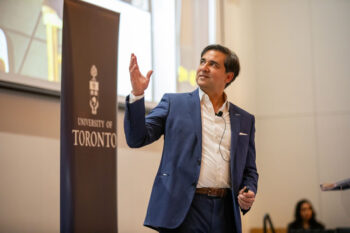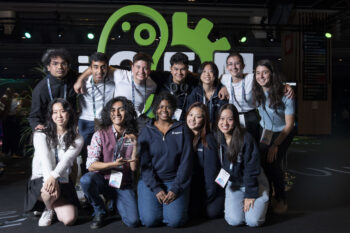Adam Radek Martínez (Year 4 EngSci) says that receiving the news of the Rhodes Scholarship left him experiencing a mix of astonishment, nervousness and excitement.
“I was walking across campus when I got the call,” he says. “All I really heard were the words ‘Welcome to the Rhodes community,’ and after that it was kind of hard to focus. I could really sense a shift in the trajectory of my future.”
Martínez is one of several members of the U of T community who were awarded Rhodes Scholarships this year. The award covers expenses for a postgraduate degree at the University of Oxford in the United Kingdom and is awarded to exceptional, public-spirited leaders from around the world. It identifies and supports young people with potential to make a positive impact on the world.
A recipient of U of T’s National Scholarship, Martínez is in his final year of the Engineering Science program, majoring in engineering physics. In between semesters, he has supplemented his studies with internships and fellowships at several leading-edge labs, located at institutions such as the University of Waterloo, the University Health Network, the Institute of Photonic Sciences (ICFO) in Barcelona and Oxford University.
A key theme of his research is the potential of new materials to solve complex challenges in many different domains, from biomedicine to sustainability.
“One example I think about a lot is catalytic materials that can convert captured carbon dioxide into products that we already need, such as methanol and ethanol,” he says.
“This could help us close the carbon loop and develop a low-carbon economy, but there are millions of potential catalytic materials to choose from. Synthesizing and testing them one by one in a lab is just too slow.”
Martínez is excited by the possibility that emerging technologies such as AI and quantum computing could be used to search through virtual libraries of potential materials, greatly accelerating the search for the ones with the properties we need.
As a thesis student at the Vector Institute, Martínez is using generative artificial intelligence models to simulate quantum circuits and bring these systems closer to reality.
Outside of his research, Martínez is passionate about open-access science, mentorship and scientific outreach. When he was still in high school, he co-founded the Flowboat Entrepreneurship Club, which is dedicated to helping high school students find mentors that can help them apply their technical skills to practical challenges.
“I grew up outside of Waterloo, Ontario, so a lot of our mentors came from the tech community there. But they might also be local farmers, who wanted to partner with students on a project that could help them grow their business or make it more efficient.”
Martínez still works with students through the club, which now has close to 400 alumni, some of whom have gone on to win major entrepreneurship competitions, such as the Diamond Challenge.
“Part of being a scientist is contributing back through mentorship. I’ve had a lot of good mentors in my career so far, so I think it’s my responsibility to facilitate that for others.”
While he expects that the Rhodes scholarship will accelerate his technical training in quantum devices, AI and the search for new materials, Martínez hopes it will also help him make new connections and find new problems to solve.
“The Rhodes community includes a lot of different people coming from different areas of the world and different disciplines,” he says. “It’s an opportunity to open dialogues, to think about the implications of my field on theirs, and to use that space to try to do good in the world.”



